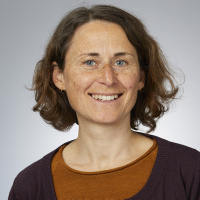Hello there, Rebecka Milestad!
Hello there - an article series to get to know KTH FOOD Faculty

Rebecka Milestad is an agronomist, doctor in rural development and docent in environmental strategies research. Milestad conducts interdisciplinary research from a systems perspective on farm and food resilience, consumer-producer links in food systems, multifunctional agriculture, urban agriculture and urban food systems, and local organic food networks from a systems perspective. She is also the co-director of KTH FOOD.
Can you tell me a little bit about your research and how it is related to food?
Being an agronomist, I am interested in how sustainable production systems can be organized and how production, distribution and consumption is connected. I do research on urban food production and provisioning systems, e.g. urban agriculture, circular food loops, municipal planning for increased resilience, and also on organic and local food systems in general. For example, one project is about how food supply chains in Sörmland can be improved so that municipalities can access more and producers sell more sustainably produced vegetables in the region. A lot of my thinking on food systems concern environmental and social sustainability as well as food preparedness and resilience. For me, these issues go hand in hand.
What do you think is the most important challenge within the food system today?
The unsustainable outcomes: for the planet, for people’s health, for animal welfare as well as the social injustices that exist in the food system. A big challenge – as for any sustainability issue – is the tension between long term sustainability and resilience and the short-term push for economic profits.
How come you have decided to conduct your research in the food system sustainability and resilience field?
I admire farmers and other food actors: the work they do and the knowledge they have. I want to learn from them, and bring different knowledge together so that we get more circular, resource efficient, sustainable and resilient food systems. The food sector is hugely important to the whole society. Food is such as basic need, and in the process of producing our food we impact climate, biodiversity, humans, animals, the landscape around us. At the moment, this impact is negative on the global scale, but we know that we could have the opposite situation if we transform the food sector.
What opportunities of contribution do you see in your research?
The systems perspective helps to understand the challenges but also the opportunities and ways out. Working with users of the research directly in research projects help the exchange of knowledge and experience. Understanding how new or alternative models of organizing the food supply chain or producing food - partly from resources we are less used to - will help to reconfigure the food system into something that is fit for the future.
What value do you see in being affiliated with KTH FOOD Centre?
KTH FOOD Centre makes food issues and my research more visible, at KTH and generally. Getting to know other researchers’ research is very enriching and gets new ideas running. Seeing new funding opportunities together with other dedicated KTH researchers is also a great opportunity.
